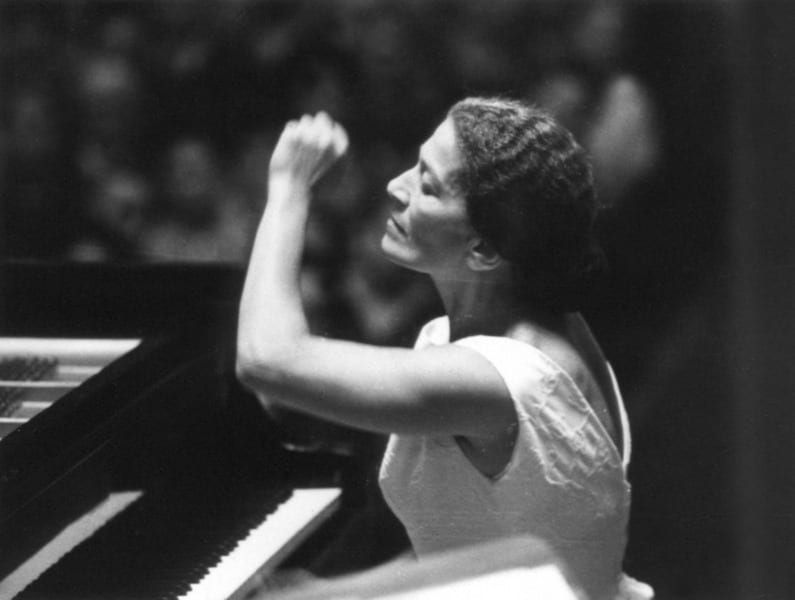March 3rd, 2022 • Music Education
Women’s History Month
Happy March from the Omaha Conservatory! Warmer weather and sunshine has us excited for the many events and concerts on the calendar for the rest of the academic year, and Summer Camps will be here before we know it! Interested in group classes for spring? Ready to jump in and enroll in a summer camp experience? Visit our summer camp or classes pages to get started, or contact us with your questions!
March is Women’s History Month! To remember and acknowledge the past, present, and future roles of the powerful and courageous women throughout history, we are thrilled to share the following blog post written by piano Artist-Faculty member Dr. Madeline Rogers. Madeline has thoughtfully highlighted just a few of the incredible women who have shaped music history in various ways, from composition to performance as well as leadership and social revolution. Keep reading to find out more!

To celebrate the courageous, creative, and tenacious female musicians throughout the years, I wanted to take you on a quick tour of some women who changed the world. Women have shaped music through composition, education, performance, leadership, and innovation for centuries, so this blog post is merely the tip of the iceberg, but it’s a great place to start!
Have you ever wondered why pianists have to perform their recitals without music? You can thank a woman for that one! The first pianist to begin systematically performing memorized recitals was a woman by the name of Clara Wieck-Schumann (1819-1896). You might know her as the wife of the famous Romantic composer, Robert Schumann, or the dear friend of another famous Romantic composer, Johannes Brahms. Clara was not only a composer herself, but was also one of the most notable pianists of the 19th Century, and her influence of memorized performance can still be seen today (sorry to my students who don’t particularly enjoy memorizing!). If you’d like to learn more about Clara Schumann and listen to some of her compositions, check out this introductory article from the LA Philharmonic.
Fear not, my string player friends, I haven’t forgotten you! As crazy as it may sound, in the 1800s piano was considered an acceptable instrument for a woman to play, but the violin was not (in fact, it was considered improper for a woman to play any stringed instrument…yikes!). Enter another groundbreaking musician who would take the world by storm, French violinist Camilla Urso (1840-1902). As a child, she was the first female to be accepted into the Paris Conservatory and would later be the first woman to perform as a solo violinist in America. To read more about how Camilla Urso inspired women across the world to pursue careers as violinists, click here!
Other influential string players include cellist May Mukle (1880-1963) and violist Rebecca Clarke (1886-1979), whose compositions for the viola are regarded as some of the finest 20th Century repertoire and still performed frequently. Clarke was also one of the first women to play in a formerly all male ensemble, the Queen’s Hall Orchestra, when she was accepted in 1912!
Trend-setting performers abounded in the 20th Century, and modern technology allows us to listen and learn from them too! Sister Rosetta Tharpe (1915-1973) is known as being the first woman to perform with electric guitar, and is also widely considered “the Godmother of Rock n Roll.” Gibson Guitars just released a 9 minute mini-documentary where you can listen, see and learn about the lasting legacy Sister Rosetta Tharpe created! Watch here:
Viola Smith (1912-2020) was the first female drummer to gain popularity in the USA with a career that lasted a lifetime. For a firsthand perspective, enjoy this 12 minute mini-documentary with interviews from Viola on her 100th birthday and lots of video clips of the “fastest girl drummer” of the 20th Century! Watch her here!
Let’s shift our perspective from performers to composers of the 20th Century. While there are many incredible women composers to learn about, I’d like to introduce you to one woman behind the scenes whose worldwide influence had a profound and lasting effect on music. Have you ever heard of Leonard Bernstein (He wrote the music for West Side Story!), Aaron Copland, Quincy Jones, Astor Piazzolla, Philip Glass, John Eliot Gardiner, Daniel Barenboim, or Elliott Carter? These composers are from all over the world and have an unbelievably varied range of styles, genres, and impact on musical culture. The one thing they all have in common is that they studied with Nadia Boulanger (1887-1979), a French educator known for shaping the sound of 20th Century music. In addition to guiding composition superstars in their prospective careers, Boulanger was also one of the first women to conduct major orchestras, opening up the career field of conducting for women today! Read about her lifelong influence here.
I could keep introducing you to women who have influenced the history of music, but truthfully you don’t have to look very far to find more! From Hildegard von Bingen (1098-1179), the very first woman in history recorded to compose music, to OCoM’s own wonderful director Ruth Meints, the world is full of innovative, inspirational women to learn from. Take some time this month to listen, research, and enjoy music from women throughout history – you can start with Tammy Miller and Elizabeth Grunin’s recital featuring compositions by women on March 12th right here at OCoM!
